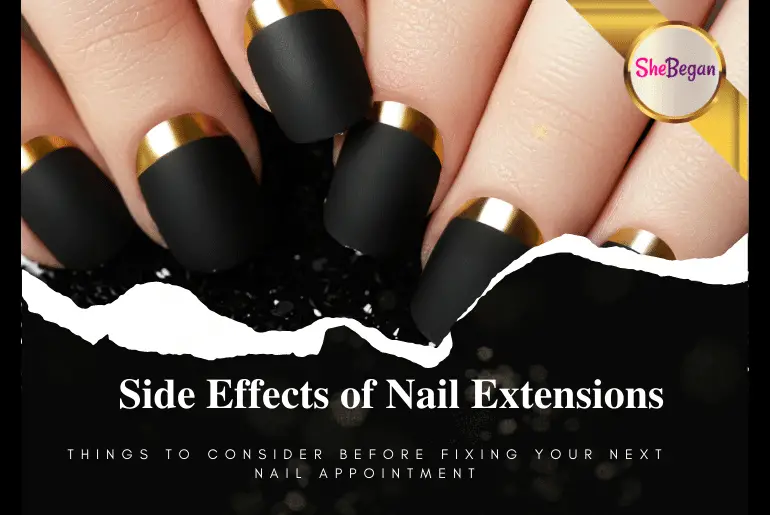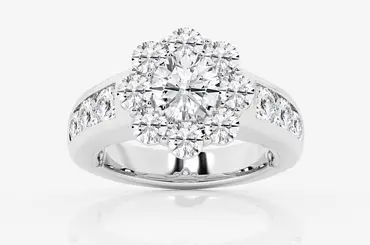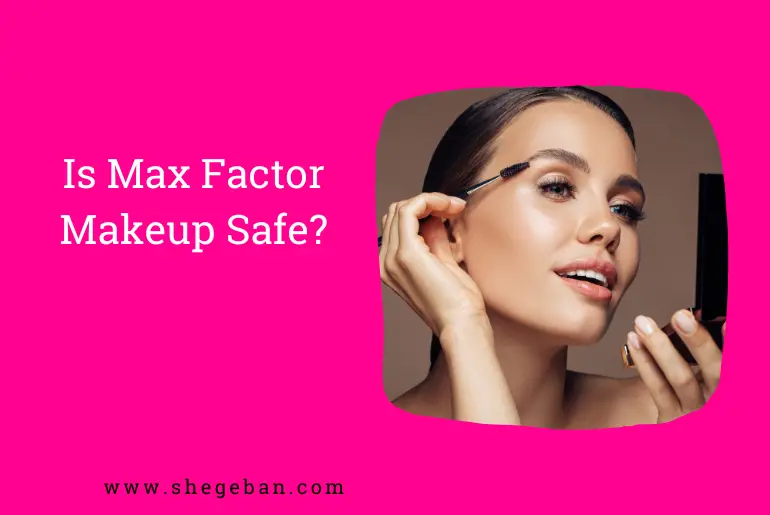Nail extensions are used to beautify the nails by adding extra length and thickness to the nail. It is an artificial nail, attached over a natural one offered in different shapes and styles.
Installing these artificial nails involves some kind of glue that is coated to hold the extension tightly. There are several various kinds of nail extensions out there and our women are having so much fun with them.
Nail extensions or fingernails, whichever way you prefer to look at them are something that can definitely make your appearance more beautiful and attractive. But, this is only if the right service is used by you or even a professional. You see, if you utilize the wrong kind of set-up for these nails, for instance, improper materials then you might be in for a big surprise. A big surprise would be the side effects of nail extensions.
Here’s everything you need to know about the side effects of nail extensions and how to be on the safe side.
Is Getting Nail Extensions Safe?

There are three major types of nail extensions, gel, silk, and acrylic nails. They are all safe as long as you do it with a professional. If applied and removed properly, all nail extensions are very safe.
However, the gel extension is considered a safer version of acrylics especially because they don’t have the powder or harsh chemicals like methyl methacrylate and toluene.
The process of getting nail extensions has been around for a long time now and has become more popular over the last few years. Using artificial nails is a great way to make your nails look beautiful and attractive, but it can also be dangerous if done incorrectly.
One of the reasons why getting nail extensions is safe is because there are many different types of artificial nails available in the market today. The most common types of artificial nails are acrylic or gel nails.
Acrylic nails are made from a liquid monomer that hardens when it comes in contact with oxygen in the air while gel nails are made from a polymer solution that hardens when it comes in contact with ultraviolet light. Just like every other good thing, nail extension has its own side effect.
TRENDING: Best Gel Nail Extensions: Ultimate Guide of Gel False Nail Extensions

5 Side Effects of Getting Nail Extension
Nail extensions are a popular way to give your nails a lift. But they’re not without their drawbacks. The side effects of nail extensions include:
1. Infection
The most common side effect is infection. If you go to a salon that doesn’t use clean tools and practices, then you could get an infection from the nail extension process itself or from the glue that holds them on. Artificial nails can increase your risk of infection because they trap dirt and germs, which can lead to bacterial or fungal infections.
The most prominent sign of nail infection is that your nails will become green or blue along with spots. If left untreated, these may cause severe skin infections. If you notice any redness, swelling, or tenderness around the nail, see your doctor as soon as possible.
2. Allergic reactions
The chemicals that are used to apply or remove artificial nails can cause your skin to become agile. The chemicals used in the removal of skin discoloration or swelling around your nails can irritate your skin. You can cause redness, pus, or swelling around your nails. Because of this, it can sometimes cause discomfort in many people.
Allergic reactions to the adhesive used in nail extensions are the most common side effect. The allergic reaction can be mild and simply cause a rash, or severe and require medical attention. If you have a severe allergy to nail glue, your doctor may prescribe you antihistamines before your appointment.
ALSO READ: Is Gel Base Coat Supposed to Be Sticky?
3. Skin irritation
Another common side effect is skin irritation around the nail bed and cuticles, especially if you’re someone who is allergic to adhesives or if you’re sensitive to materials like acrylic gel or silk wraps used in artificial nails.
If you experience this type of irritation, try using an antibacterial cream instead of nail polish remover when removing your extensions; this way, you won’t be exposing your skin to any harsh chemicals that could worsen your reaction.
4. Weak your natural nails
Artificial nails can make it difficult for your natural nails to grow out properly because they’re constantly being filed down during application. This causes them to weaken over time, which means more frequent trips back to the salon for more extensions. Some people’s natural nails never recover after years of wearing false ones, so they end up having a weak natural nail.
Nail extensions can weaken your natural nails over time because they don’t allow them to breathe or grow. This can cause your own nail bed to become dry, brittle, and prone to breakage.
5. Experience pain when separating from natural nail
One of the most common complaints about fake nails is that they are uncomfortable to live with on a day-to-day basis. If you need to take off your extensions, this can be particularly problematic because it can hurt if you don’t remove them properly. The same goes for getting them to put on the process can be uncomfortable and even painful.
However, most pains come when the nail extension breaks or forcefully spills. Make sure you visit a saloon ASAP when you are in a similar situation.
How to Minimize Damage to Nail Extensions
Here are a few tips for how to minimize damage to nail extensions:
- If you already have a fungal infection, avoid using artificial nails.
- Don’t wear them too long. If you’re using acrylic nails, don’t leave them on longer than two weeks at a time.
- Be sure to tell your manicurist not to cut or push back the cuticles too much. They help prevent infection by keeping dirt out of your nails.
- It’s a good idea to go without artificial nails for two months. That way, your real nails will stay strong and healthy, and you won’t be exposed to any harmful chemicals.
- Keep your nails well moisturized by applying cream during and after cleaning them with acetone.
- Use high-quality nail glue that is made for artificial nails. The glue that is not made for artificial nails may contain ingredients that will damage your natural nails.
- Wear gloves when doing household chores such as cleaning or washing dishes, especially if there is any chance of coming into contact with water or chemicals in the process.
How Long Should My Nail Extension Stay On?
When applied correctly, your nail extensions should last anywhere between 2 to 3 weeks. However, 2 weeks on and 2 weeks off are recommended for your natural nail health.
If you are going on holiday or need your nails to look good for an event then it is possible to have them put on for a longer period of time. However, this may affect the condition of your natural nails and we will advise against this if it is not absolutely necessary.
It is important to remember that you will notice a difference in the condition of your natural nails during the time that they are removed. If this is something that worries you there are salons that can offer treatments such as manicures and pedicures which will help maintain their condition while they are being removed.
Things to Consider Before Fixing Your Next Nail Appointment
There’s no denying that getting a manicure and/or pedicure is one of the most relaxing beauty rituals out there. But before you book your next appointment, you may want to consider the following things.
- It’s important not to skimp when choosing a salon. A good salon will have well-trained, experienced staff with years of experience under their belts. In addition, they use cleanliness to ensure a healthy environment.
- Back-to-back nail appointments are bad and it is a big NO-NO. Giving your nails time to recover after treatment is important.
- Pregnant women should avoid all forms of nail extensions. Because of the chemicals involved in achieving beautiful nails, manicures can sometimes be harmful to your health.
- Be ready to dedicate a good 1-2 hours to your nail job. A rushed manicure can be a bad idea, so take your time.
- Make sure your technician wears gloves and uses disinfectant when working on your nails.
Conclusion
Before booking nail extensions, make sure you are in good health. There are potential risks especially if your immune system is weak. It is also a good idea to take care of your nails before and after the application of the extensions. Make sure you use a good hand lotion, avoid frequent exposure to water and try to eat healthy to strengthen your immune system. Take a multivitamin every day and make sure you get enough rest.





